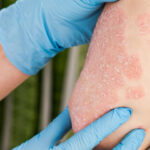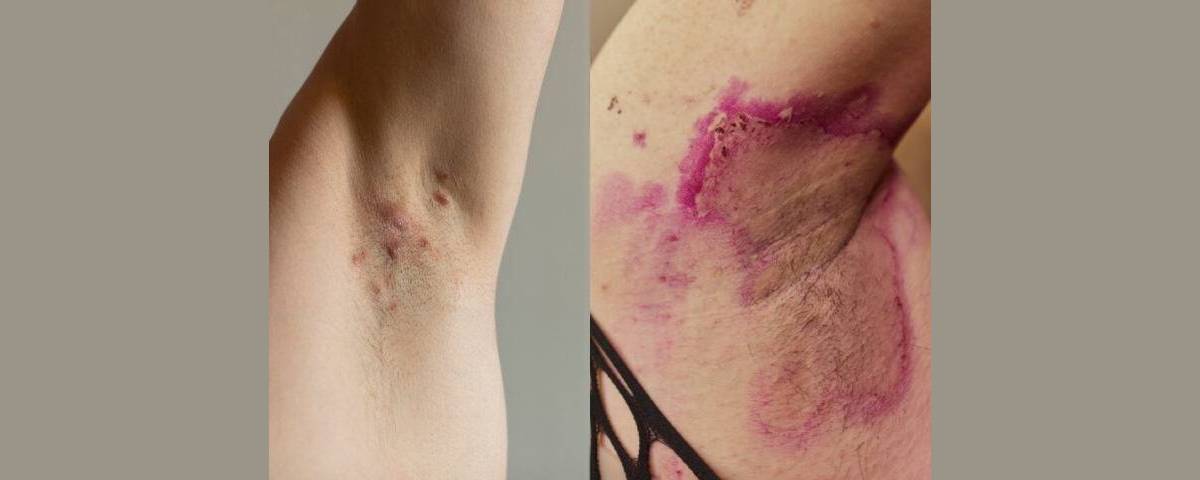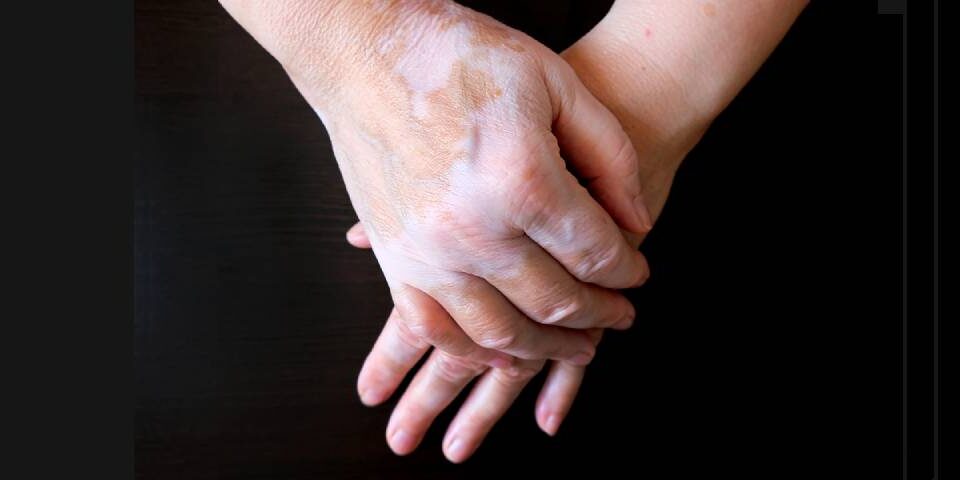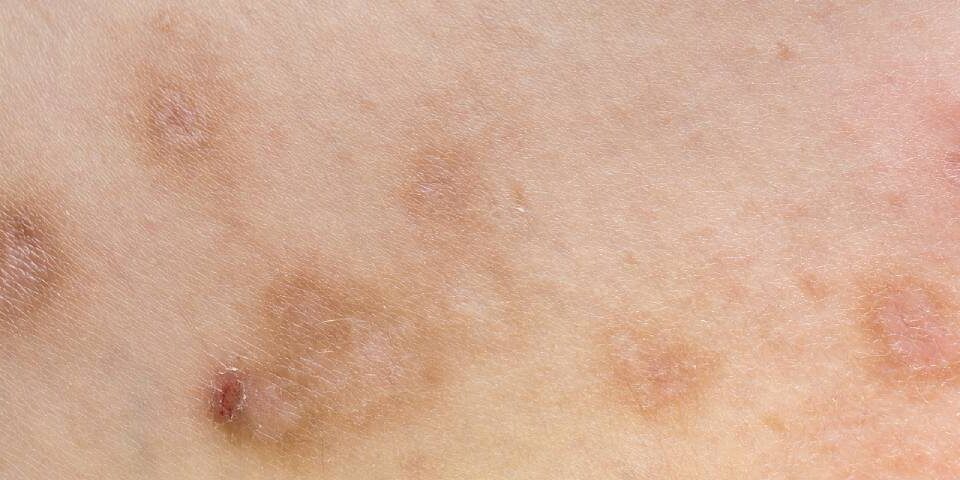
Psoriasis Explained: From Symptoms to Solutions
September 5, 2024
A dermatologist wearing gloves examines the skin of a sick patient. Examination and diagnosis of skin diseases-allergies, psoriasis, eczema, dermatitis.
Hidradenitis suppurativa (HS) is a chronic, autoimmune inflammatory disorder causing painful, deep, pea-sized lumps and nodules under the skin, particularly in sweaty areas like the armpits, groin, inner thighs, and under the breasts. These bumps are an inflammatory response from the body as it attacks its own hair follicles. HS is not contagious and seems to have a genetic component. Currently, there is no cure for hidradenitis suppurativa, which typically begins in puberty and is most common in patients between the ages of 20 and 40 years old. The Apex Clinical Research Center is currently participating in hidradenitis suppurativa clinical trials to discover better, more effective treatment options.
Symptoms of Hidradenitis Suppurativa
Hidradenitis Suppurativa (HS) symptoms are location-specific. In other words, if you have something that looks like severe, cystic acne in any of these locations, it could be HS instead of acne:
- Large pimple-like sores or lumps in the armpits
- Lumps or cysts on the thighs between the legs
- Boil-like lumps or cysts under the breasts
- Cysts in the groin area or the buttocks
These boil-like nodules occur in sweaty, friction-prone areas like the armpits, between the legs and buttocks, the groin area, and under the breasts. These recurring lumps hurt, take a long time to heal, and often cause fibrous scarring and tunnels under the skin.
Hidradenitis Suppurativa (HS) Causes and Risk Factors
Scientists have not yet discovered a conclusive cause of hidradenitis suppurativa, although they believe genetics plays a significant role. Many case studies suggest that environmental and hormonal factors contribute to HS eruptions. Some commonalities indicate that risk factors for HS include:
- Being female: women experience hidradenitis suppurativa more often than men
- Being overweight
- Smoking
- Hirsutism (excessive hair growth)
- Having a predisposition for acne
- You have family members who have also had HS
- Hormonal fluctuations (androgens, estrogen) that are common during adolescence and before menopause
Hidradenitis Suppurativa is an autoimmune disorder. The body starts attacking the hair follicles, which causes inflammatory lumps and nodules. A person may suffer from hidradenitis suppurativa for many years before the condition resolves, and not just with the pain and bumps themselves. Sometimes these abscesses burst open and drain, causing an unpleasant odor. It can make ordinary, everyday activities painful. In addition to the physical pain and scarring, HS can cause mental and emotional suffering. HS is not contagious, nor does it occur because people neglect personal hygiene. It does not respond to extra washing, bathing, soaps, deodorants, powders, etc. Your dermatologist can diagnose and provide hidradenitis suppurativa treatment.
Current Hidradenitis Suppurativa Treatment Options
Three general types of hidradenitis suppurativa treatment protocols currently exist. Here, we outline them so that you can have an informed discussion about your options with your dermatologist.
Topical Treatments and Antibiotics
Currently, topical treatments and antibiotics for HS can take four forms:
- Antibacterial Washes:These are used to reduce bacterial load and prevent secondary infections.
- Topical Antibiotics: Clindamycin is commonly used for mild cases to reduce inflammation and bacterial infection.
- Oral Antibiotics: Tetracyclines (doxycycline and minocycline) are often used for their anti-inflammatory properties.
- Combination Therapy: For severe cases of HS, a combination of topical treatments and oral antibiotics like clindamycin and rifampin may be recommended.
Biologics
Biologics are complex medications created from components of living plant, animal, or microorganism cells, often using DNA or rDNA technology for therapeutic effect. Current biologic medications for the treatment of hidradenitis suppurativa include:
- Adalimumab (Humira) attacks one of the main proteins that causes HS inflammation. It is injected under the skin for patients 12 or older with moderate to severe HS that has not responded to other treatments.
- Secukinumab (Cosentyx) inhibits the activity of one of the specific signaling proteins (cytokines) that contributes to HS inflammation in adults with moderate to severe HS.
Surgery
Some surgical interventions for the treatment of hidradenitis suppurativa involve:
- Incision and drainage to relieve pain and pressure for acute flare-ups.
- Excision: Surgical removal of affected tissue for severe, recurrent cases. Wide excision followed by skin grafting can help reduce recurring lesions.
- Laser Therapy: CO2 laser treatments can help reduce lesions and scarring.
Our Hidradenitis Suppurativa Clinical Trials: A Hopeful Step Towards Better Treatment
Apex Clinical Research Center is participating in several hidradenitis suppurativa (HS) clinical trials that offer different research study options including injectable and oral tablets to advance HS treatment that target the lesions on the skin. Marlise Fletter, a CNP at Apex Clinical Research Center, recently spoke with host Michael Liner of the Triple D Podcast about HS clinical trials, so please watch the YouTube video for more information. Our objective in these clinical trials is to learn how well patients tolerate the study medication and what dosage provides the best response.
Eligibility Criteria for Study Participants
Study participants must have been diagnosed with moderate to severe hidradenitis suppurativa (HS) based on their clinical history and physical examination for at least six months before randomization.
Benefits of Participating in HS Clinical Trials
If you struggle with HS, participating in our hidradenitis suppurativa clinical trials can give you an opportunity to help discover new therapies and medicines for this condition. Medical professionals closely monitor your care during the study. This enables participants to contribute to medical research and potential future treatments. Additionally, there is no cost to the patients or their insurance if they are selected to participate in the study. Most studies provide compensation to the patient.
How to Get Involved in Our Hidradenitis Suppurativa Clinical Trials
Apex Clinical Research Center is excited to participate in hidradenitis suppurativa clinical trials. Understanding more about HS and finding new and better treatment options can help more patients find hidradenitis suppurativa relief. If you are interested in applying to participate in our HS Clinical Trials, please visit our application page and fill out the form or call us at 440-940-2739. Our research team will then reach out to you with further information about your eligibility and the next steps in the process.




